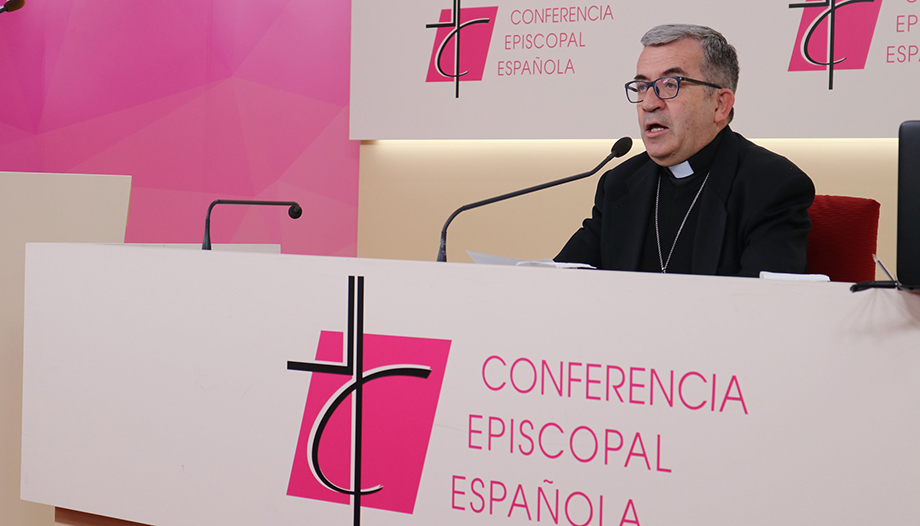









Msgr. Luis Argüello led the telematic press conference with which the Spanish Episcopal Conference published the conclusions of the Permanent Commission held in person and telematically on February 23 and 24.
José Manuel Lorca, as president of the Episcopal Commission for Social Communications after the death of Bishop Juan del Río. As the oldest member by episcopal ordination, the Bishop of Cartagena will perform these functions until the next Plenary.
"There is concern that euthanasia is being sold as an act of freedom."
Bishop Argüello has developed the topics that have been discussed in this Permanent Commission, although, in the questions of the journalists, some issues have emerged that continue to be of serious concern for the Spanish Church.
In this regard, the process carried out by the Government with respect to the Euthanasia Law, the spokesman for the bishops emphasized that "for the Church, the law in its first draft was already a great concern for the bishops. We have spoken out repeatedly, for example, with the EEC document on good death. The amendments that make the exercise of suicide, presenting it as an exercise of self-determination or as the culmination of freedom, are of great concern to us and aggravate the negative qualification of the law itself".
Abuses in the Church "affect us to a small extent and to a very serious extent".
The case of the Offices for the care of victims of abuse that have been set up in the Spanish dioceses following the wishes of Pope Francis was also discussed. In this regard, Bishop Argüello stressed that "in our country, the number of abuses within the Church is very small. However, this does not take away the guilt and seriousness of each of the cases".
The bishops who are members of the Standing Commission reported on the work of the of the diocesan offices for the protection of minorsThe report describes its activity in the first months of its operation and the initiatives carried out in the areas of victim care, prevention and training.
They have also studied the convenience of a service in the EEC of "help and coordination, assistance, resources and proposals to advance in prevention, attend to the victims and offer a service to the dioceses to deal with these situations, all in contact with the Religious Congregations". The topic will be taken to the Plenary Assembly scheduled for April 19-23.
In this line, the bishops' spokesman stressed that "in the Church we are concerned about the general situation of the increase in cases of abuse, in whatever field, but especially, for example, in the family, which has increased in this time of pandemic," he said, referring to the data offered by the ANAR foundation.
Bishop Argüello wanted to stress that the reality of abuse in the Spanish Church "affects us to a small extent and to a very serious extent" in the sense that "the percentage of cases in the Spanish Church is much lower than in other European countries", but that "does not diminish the seriousness, does not diminish the effort to eradicate it".
Argüello stressed that "the first compensation that the victims want is that the Church that hurt them receives them and consoles them, recognizes their guilt and makes reparations".
The immatriculations The Secretary General of the EEC, who has explained the legal process of immatriculation and has again shown his willingness to dialogue in the case of immatriculations that may present doubts as to the right of ownership, has been questioned on other issues.
Topics specific to the Standing Committee
Among the topics dealt with by the permanent commission, Bishop Argüello focused especially on the following work carried out on the new education lawLOMLOE. In addition to congratulating Raquel Perez San Juan, Secretary of the Commission, on her appointment as a member of the State School Board, she also wanted to highlight the Forum Towards a new Catholic Religion CurriculumThe first session took place on Tuesday afternoon and was attended, among others, by Card. Bagnasco, president of the Council of European Bishops' Conferences (CCEE) and Alejandro Tiana Ferrer, Secretary of State for Education.
Referring to this forum, which will continue in the coming weeks, the spokesman for the bishops pointed out that it is an "exercise in dialogue, which is what the EEC wanted to emphasize with respect to the new law. We want to continue this dialogue at this moment of development and application of such an important law as education". He also pointed out that, from the bishops, "we are convinced that religious education can provide a humanizing, transcendent and solid proposal at this time of challenge".
Other topics such as the Year of the Family were also discussed. Amoris Laetitia or the application of the procedures of compliance in the Spanish dioceses, as stated in the Note published by the EEC at the end of this Standing Committee.












